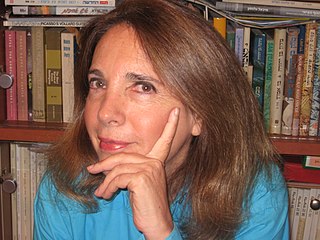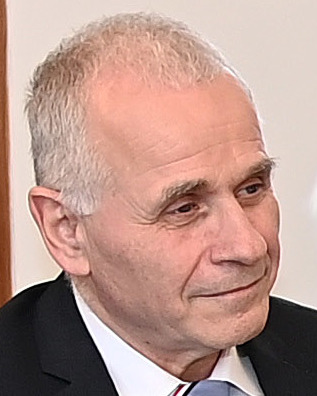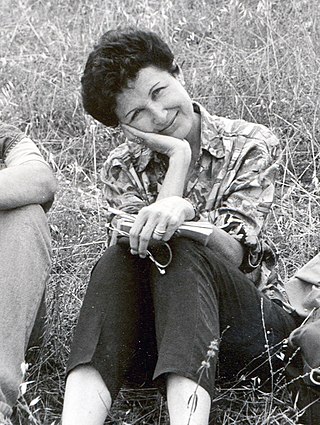Related Research Articles

Shmuel Yosef Agnon was an Austro-Hungarian-born Israeli novelist, poet, and short-story writer. He was one of the central figures of modern Hebrew literature. In Hebrew, he is known by the acronym Shai Agnon. In English, his works are published under the name S. Y. Agnon.

The Hebrew University of Jerusalem is a public research university based in Jerusalem, Israel. Co-founded by Albert Einstein and Chaim Weizmann in July 1918, the public university officially opened in April 1925. It is the second-oldest Israeli university, having been founded 30 years before the establishment of the State of Israel but six years after the older Technion university. The HUJI has three campuses in Jerusalem and one in Rehovot. Until 2023, the world's largest library for Jewish studies—the National Library of Israel—was located on its Edmond J. Safra campus in the Givat Ram neighbourhood of Jerusalem.

The Herbert D. Katz Center for Advanced Judaic Studies at the University of Pennsylvania, commonly called the Katz Center, is a postdoctoral research center devoted to the study of Jewish history and civilization.
Shortly prior to and during World War II, and coinciding with the Second Sino-Japanese War, tens of thousands of Jewish refugees were resettled in the Japanese Empire. The onset of the European war by Nazi Germany involved the lethal mass persecutions and genocide of Jews, later known as the Holocaust, resulting in thousands of Jewish refugees fleeing east. Most ended up in Japanese-occupied China.
Raphael Israeli is an Israeli historian and writer. He is a professor emeritus of Middle Eastern, Islamic and Chinese history at the Hebrew University of Jerusalem, as well as a research fellow at Truman Institute for the Advancement of Peace and the Jerusalem Center for Public Affairs.
Irene Eber was an Israeli sinologist. She was the Louis Frieberg Professor of East Asian Studies (emeritus) at the Hebrew University of Jerusalem (sinologist), and Senior Fellow of the Harry S. Truman Research Institute. She lived in Jerusalem. She was also a specialist in translations from Chinese.

Nitza Ben-Dov is Professor of Hebrew and Comparative Literature at the University of Haifa. Winner of the 2021 Israel Prize

Doron Ben-Ami is an Israeli archaeologist.
Eyal Ben-Ari is a former professor of anthropology in the Department of Sociology and Anthropology at the Hebrew University of Jerusalem (HUJI). His research interests include Japan as well as the Israeli Defence Forces. He served as the head of the university's Harry S. Truman Research Institute for the Advancement of Peace until January 2007, and also taught the Introduction to Anthropology course, making him well known to students.

Ephraim Stern was an Israeli archaeologist and professor at the Hebrew University of Jerusalem. He specialized in the archaeology of ancient Israel and Judah and Phoenicia, and was known for his excavations at Tel Dor (1980–2000).
The Japanese-Jewish common ancestry theory is a fringe theory that appeared in the 17th century as a hypothesis which claimed the Japanese people were the main part of the Ten Lost Tribes of Israel. A later version portrayed them as descendants of a tribe of Central Asian Jewish converts to Nestorian Christianity. Some versions of the theory applied to the whole population, but others only claimed that a specific group within the Japanese people had descended from Jews.
Alexander Rofé is and author and Professor Emeritus of the Bible at the Hebrew University of Jerusalem.

Uri Aviram is Zena Harman Professor Emeritus of Social Work at the Hebrew University of Jerusalem. In January 2016 he was appointed as the Dean of the School of social and community Sciences at Ruppin Academic Center in Israel. He retired in 2017, continuing research on mental health policy and services.
Institute for Medical Research, Israel-Canada (IMRIC) is a research institute affiliated with the Faculty of Medicine of the Hebrew University of Jerusalem.
Shlomo Herberg (1884–1966) was an Israeli poet, writer translator, writer of Hebrew literature, and teacher of Lithuanian Jewish descent, who was born in what is now Kudirkos Naumiestis, Lithuania. He was one of the first professional Hebrew translators in the Land of Israel Tchernichovsky Prize Tchernichovsky Prize for Model Translations for the year 1960. He published many poems, books, songs, stories, and lists.

Michal Linial is a Professor of Biochemistry and Bioinformatics at the Hebrew University of Jerusalem (HUJI). Linial is the Director of The Sudarsky Center for Computational Biology at HUJI. Since 2015, she is head of the ELIXIR-Israel node.

Asher Cohen is an Israeli psychologist. He has been the 14th President of the Hebrew University of Jerusalem since September 1, 2017, and holds the university's Samuel Sturman Chair in Psychology.

Hanoch Gutfreund is the Andre Aisenstadt Chair in theoretical physics and was the president at the Hebrew University of Jerusalem. Prior to his presidency, he was a professor at the university.

Joseph Gerhard Liebes was an Israeli translator and scholar of Ancient Greek classical literature and Latin literature into Hebrew. He translated Plato's writings into Hebrew.

Aliza Cohen-Mushlin is an Israeli art historian, a specialist in medieval Latin and Hebrew manuscripts and Jewish architecture, an author of important researches on the medieval scriptorium.
References
- ↑ "Ben-Ami Shillony". Pluto.huji.ac.il. Retrieved 2017-06-13.
- ↑ "Prof (Emeritus) Ben-Ami Shilony | Department of Asian Studies". En.asia.huji.ac.il. Retrieved 2017-06-13.
- ↑ "Ben Ami Shillony". Japan-studies.org. Archived from the original on 2017-10-25. Retrieved 2017-06-13.
- ↑ "Prof. Ben-Ami Shillony". Japan-studies.org. 2017-01-24. Archived from the original on 2018-01-29. Retrieved 2017-06-13.